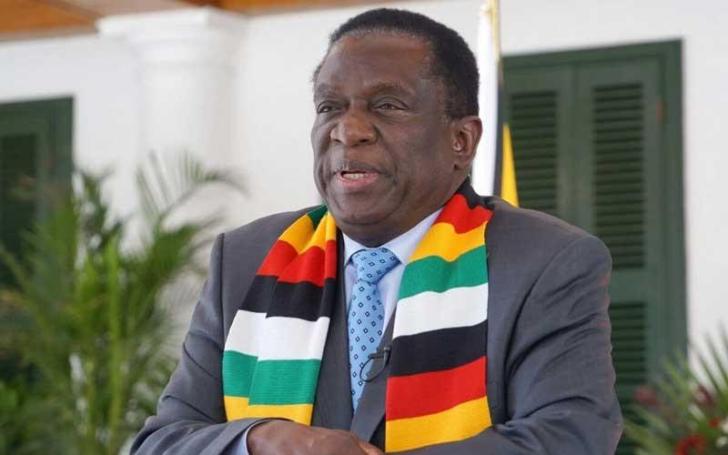News / National
Mnangagwa signs 5 aviation protocols
02 Oct 2024 at 06:48hrs |
0 Views

President Emmerson Mnangagwa has taken a significant step in supporting international civil aviation by signing five instruments of ratification and accession related to the International Civil Aviation Organisation (ICAO). This move reaffirms Zimbabwe's commitment to ICAO's goals of establishing a safe, secure, orderly, and sustainable international air transport system.
ICAO, a specialized agency of the United Nations, coordinates the principles and techniques of international air navigation and fosters the planning and development of international air transport to ensure safe and orderly growth.
Transport and Infrastructural Development Minister Felix Mhona confirmed these developments in a recent statement. He highlighted that, in line with Section 327 (2) (a) of the Constitution of Zimbabwe, President Mnangagwa approved the signing of the instruments for their deposition, following their approval by Parliament. The deposition was executed at the ICAO headquarters in Montreal, Canada, on August 29, 2024.
Among the signed instruments are several key conventions, including the 1999 Montreal Convention for the Unification of Certain Rules for International Carriage by Air, and the 2010 Beijing Convention on the Suppression of Unlawful Acts relating to International Civil Aviation. Additionally, the President ratified two Montreal Protocols relating to amendments of Articles 50 (a) and 56 of the 1944 Convention on International Civil Aviation.
Moreover, President Mnangagwa signed the Instrument of Accession to the 2001 Cape Town Protocol, addressing international interests in mobile equipment specific to aircraft. This instrument will be deposited with the International Institute for the Unification of Private Law (UNIDROIT) in Rome, Italy. The primary aim of this Protocol is to resolve challenges related to obtaining certain and opposable rights to high-value aviation assets, such as airframes and aircraft engines, which often lack a fixed location.
Minister Mhona elaborated on the implications of these actions, explaining that varying legal systems create uncertainties for lending institutions regarding the efficacy of their rights, thus hampering financing for aviation assets and increasing borrowing costs. He emphasized that Zimbabwe remains committed to the multilateral aviation system within the framework of ICAO.
This initiative follows recent investments in airport infrastructure, notably the US$153 million facelift of the Robert Gabriel Mugabe International Airport. Aviation Ground Services (AGS) praised the government for its efforts, stating that these developments align with global standards and will help attract more airlines to Zimbabwe.
In a further demonstration of increased connectivity, Uganda Airlines recently commenced flights on the Harare-Entebbe route, responding to growing demand for air transport between the two countries. This move aims to boost economic and tourism sectors, with expectations that frequent flights will also stimulate bilateral trade.
In an interview, AGS managing director Caleb Mudyawabikwa noted that the organization will continue to provide comprehensive airport passenger and cargo handling services at Zimbabwe's commercial airports. He expressed optimism that the country is becoming an attractive destination as more airlines show interest in flying into Zimbabwe.
President Mnangagwa's actions signal a robust commitment to enhancing international aviation partnerships and integrating Zimbabwe more effectively into the global air transport network.
ICAO, a specialized agency of the United Nations, coordinates the principles and techniques of international air navigation and fosters the planning and development of international air transport to ensure safe and orderly growth.
Transport and Infrastructural Development Minister Felix Mhona confirmed these developments in a recent statement. He highlighted that, in line with Section 327 (2) (a) of the Constitution of Zimbabwe, President Mnangagwa approved the signing of the instruments for their deposition, following their approval by Parliament. The deposition was executed at the ICAO headquarters in Montreal, Canada, on August 29, 2024.
Among the signed instruments are several key conventions, including the 1999 Montreal Convention for the Unification of Certain Rules for International Carriage by Air, and the 2010 Beijing Convention on the Suppression of Unlawful Acts relating to International Civil Aviation. Additionally, the President ratified two Montreal Protocols relating to amendments of Articles 50 (a) and 56 of the 1944 Convention on International Civil Aviation.
Moreover, President Mnangagwa signed the Instrument of Accession to the 2001 Cape Town Protocol, addressing international interests in mobile equipment specific to aircraft. This instrument will be deposited with the International Institute for the Unification of Private Law (UNIDROIT) in Rome, Italy. The primary aim of this Protocol is to resolve challenges related to obtaining certain and opposable rights to high-value aviation assets, such as airframes and aircraft engines, which often lack a fixed location.
This initiative follows recent investments in airport infrastructure, notably the US$153 million facelift of the Robert Gabriel Mugabe International Airport. Aviation Ground Services (AGS) praised the government for its efforts, stating that these developments align with global standards and will help attract more airlines to Zimbabwe.
In a further demonstration of increased connectivity, Uganda Airlines recently commenced flights on the Harare-Entebbe route, responding to growing demand for air transport between the two countries. This move aims to boost economic and tourism sectors, with expectations that frequent flights will also stimulate bilateral trade.
In an interview, AGS managing director Caleb Mudyawabikwa noted that the organization will continue to provide comprehensive airport passenger and cargo handling services at Zimbabwe's commercial airports. He expressed optimism that the country is becoming an attractive destination as more airlines show interest in flying into Zimbabwe.
President Mnangagwa's actions signal a robust commitment to enhancing international aviation partnerships and integrating Zimbabwe more effectively into the global air transport network.
Source - The Chronicle
Join the discussion
Loading comments…





































